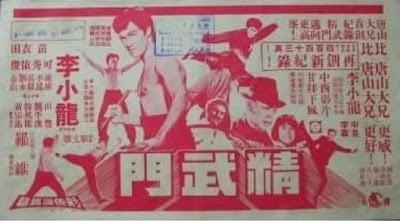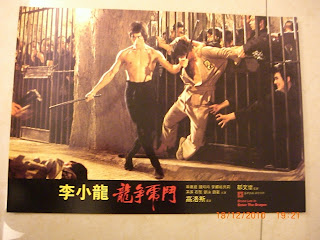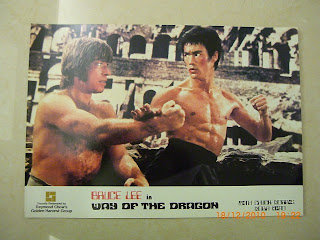Bruce Lee legend
Sunday 20 November 2016
Wednesday 26 October 2016
Bruce Lee Movie Poster Original
This is an original Bruce Lee movie poster from Thailand drwan by a famous Thai artist. The colour and overall layout is superb as it highlighted the key essence of the movie.
Saturday 18 December 2010
Bruce Lee's Original movie cinema posters
 These are the original movie cinema's posters that were used for preview in the cinema during the 1970s
These are the original movie cinema's posters that were used for preview in the cinema during the 1970s片中,李小龍迅猛的三腳迴旋連環踢、凌空飛腳以及高亢的嘯叫等武打噱頭皆極具個性,令觀眾如癡如醉,功夫熱潮因而掀起。該片創下了香港開埠以來的電影最高票房紀錄,達到300萬港元。
當時粵語片正陷於低潮,幾乎停止生產。他替羅維拍《唐山大兄》及《精武門》,原版都是國語對白,後來嘉禾重新發行才配上粵語。在此形勢下,李小龍憑藉著一身好武藝與個人銀幕魅力,不僅在七十年代初期掀起一股電影熱潮,將觀眾拉回戲院中,讓衰退的香港電影工業重新找到一線生機,使嘉禾公司奠定基礎;亦使「功夫片」復甦,賦予新的面貌與活力。他的電影也身價百倍,轟動了全球,讓人們對中國電影刮目相看。
講述創辦精武體育館的民族英雄霍元甲遭日本人毒殺,其愛徒陳真(李小龍飾)為師父報仇雪恨。
李小龍盡量避免使用蹦床等輔助工具,也不用替身演出危險鏡頭,且李小龍首次將雙節棍搬上銀幕,並道出一句經典對白:「中國人不是東亞病夫」,自此成為了香港電影的一大經典。該片票房收入超過400萬,位列當年賣座港產片的亞軍。
李小龍與嘉禾公司合組協和公司,是惟一一部自編自導自演的影片。李小龍在片中飾演一個來自香港鄉村的功夫高手唐龍,遠赴義大利幫助一家中餐館的女老闆(苗可秀飾)剷除當地惡霸。主要的打鬥部分被安排到羅馬鬥獸場,《猛龍過江》也由此成為香港電影史上第一部遠赴歐洲取景的影片。
本片在台灣放映,創有史以來的最高票房記錄,並獲得第十一屆金馬獎的優等劇情片獎。
該片為李小龍的巔峰之作,是打鬥場面最多,使用武器最多,以及在系列中最賣座的一部。在片裡比武中,李小龍展示出少林齊眉棍、菲律賓短棍、雙節棍等絕技。1973年5月10日,李小龍在拍攝本片時於戲場內昏迷,差點不省人事。
講述一位強者為了奪得傳說中的稀世珍寶而獨闖七層寶塔,經過一輪惡鬥後到達塔頂,卻只換來一句古老的謁語:「生是一個等待死亡的歷程」。豈料一語成讖,該片成了李小龍的未竟遺作。
1978年,為了紀念李小龍,該片被用替身重新拍攝,但劇情與李小龍原意已大相徑庭。由於觀眾對李小龍的懷念,該片同樣獲得了較高的票房。與其說是這部電影獲得了歡迎,不如說是李小龍臨終前的一段極其寶貴的武打影像吸引了無數觀眾。由於在武術和電影等方面有卓越的貢獻,他先後在1972年和1973年兩度被國際權威武術雜誌《黑帶》評為世界7大武術家之一。1972年,李小龍更獲香港評為10大明星之一,香港報紙讚譽他為「當代中國武術及電影史上的奇才;美國洛杉磯市將《死亡遊戲》開映日(7月8日)定為李小龍日;他作為惟一入選的華人獲《時代》雜誌評為「20世紀的英雄與偶像」
Bruce Lee lentika
Bruce Lee (born Lee Jun-fan; 27 November 1940 – 20 July 1973) was a Chinese American[2] and Hong Kongactor,[3] martial arts instructor,[4] philosopher, film director, film producer, screenwriter, and founder of theJeet Kune Do martial arts movement. He is considered one of the most influential martial artists of the 20th century, and a cultural icon.[5]
Lee was born in San Francisco, California in the United States, to parents of Hong Kong heritage but raised in Hong Kong until his late teens. Upon reaching the age of 18, Lee emigrated to the United States to claim his U.S. Citizenship[6] and receive his higher education. It was during this time he began teaching martial arts, which soon led to film and television roles.
His Hong Kong and Hollywood-produced films elevated the traditional Hong Kong martial arts film to a new level of popularity and acclaim, and sparked a major surge of interest in Chinese martial arts in the West in the 1970s. The direction and tone of his films changed and influenced martial arts and martial arts films in Hong Kong and the rest of the world as well. He is noted for his roles in five feature-length films, Lo Wei's The Big Boss(1971) and Fist of Fury (1972); Way of the Dragon (1972), directed and written by Lee; Warner Brothers' Enter the Dragon (1973), directed by Robert Clouse; and The Game of Death (1978), directed by Robert Clouse posthumously.
Lee became an iconic figure known throughout the world, particularly among the Chinese, as he portrayed Chinese nationalism in his films.[7] While Lee initially trained inWing Chun, he later rejected well-defined martial art styles, favouring instead to utilise useful techniques from various sources in the spirit of his personal martial arts philosophy he dubbed Jeet Kune Do (The Way of the Intercepting Fist).
------------------------------
This is a Bruce lee card that can shows the movement.
Bruce Lee lentika
Bruce Lee (born Lee Jun-fan; 27 November 1940 – 20 July 1973) was a Chinese American[2] and Hong Kongactor,[3] martial arts instructor,[4] philosopher, film director, film producer, screenwriter, and founder of theJeet Kune Do martial arts movement. He is considered one of the most influential martial artists of the 20th century, and a cultural icon.[5]
Lee was born in San Francisco, California in the United States, to parents of Hong Kong heritage but raised in Hong Kong until his late teens. Upon reaching the age of 18, Lee emigrated to the United States to claim his U.S. Citizenship[6] and receive his higher education. It was during this time he began teaching martial arts, which soon led to film and television roles.
His Hong Kong and Hollywood-produced films elevated the traditional Hong Kong martial arts film to a new level of popularity and acclaim, and sparked a major surge of interest in Chinese martial arts in the West in the 1970s. The direction and tone of his films changed and influenced martial arts and martial arts films in Hong Kong and the rest of the world as well. He is noted for his roles in five feature-length films, Lo Wei's The Big Boss(1971) and Fist of Fury (1972); Way of the Dragon (1972), directed and written by Lee; Warner Brothers' Enter the Dragon (1973), directed by Robert Clouse; and The Game of Death (1978), directed by Robert Clouse posthumously.
Lee became an iconic figure known throughout the world, particularly among the Chinese, as he portrayed Chinese nationalism in his films.[7] While Lee initially trained inWing Chun, he later rejected well-defined martial art styles, favouring instead to utilise useful techniques from various sources in the spirit of his personal martial arts philosophy he dubbed Jeet Kune Do (The Way of the Intercepting Fist).
------------------------------
This is a Bruce lee card that can shows the movement.
Bruce Lee Legend
Bruce Lee - The Big Boss was th first Bruce lee movie that I have watched. I remembered watching the movie when I was in primary school and after watching the movie, the Bruce Lee's fever has deeply entrenched in my mind..
Bruce Lee nos 1! yayaya!
Bruce Lee nos 1! yayaya!
Subscribe to:
Posts (Atom)












